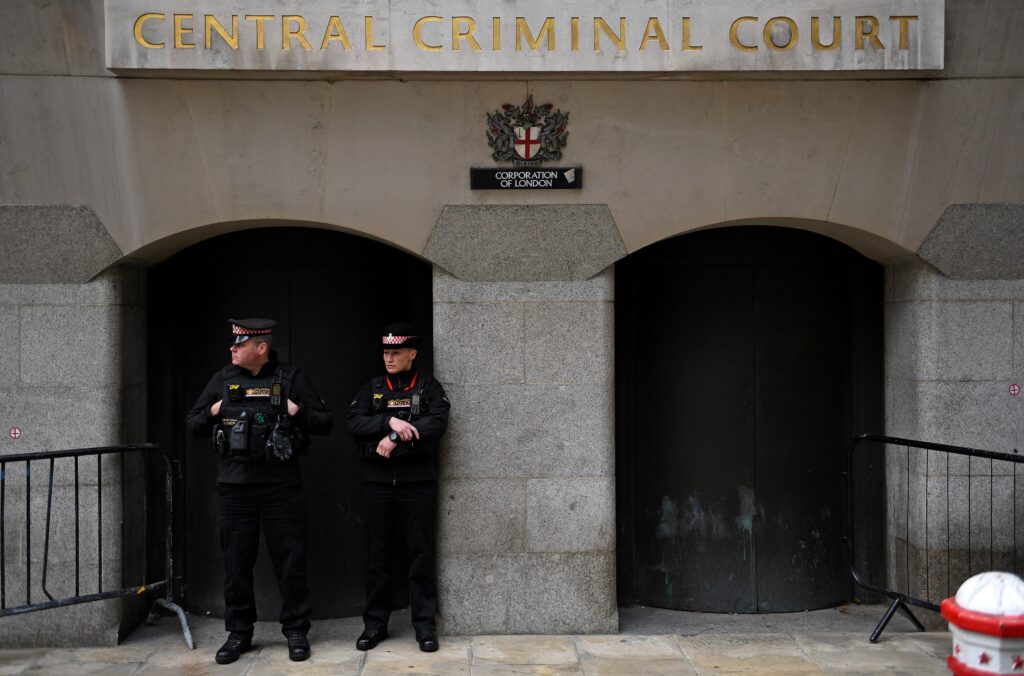Royaume-Uni: six Bulgares coupables d’espionnage au profit de Moscou dans l’attente de leur peine
Six Bulgares, quatre hommes et deux femmes membres d’un réseau d’espions surnommé “Les Minions”, comparaissent à partir de mercredi devant la justice londonienne et risquent plusieurs années de prison pour espionnage au profit de la Russie.Vanya Gaberova, 30 ans, Katrin Ivanova, 33 ans, Tihomir Ivanov Ivanchev, 39 ans, Orlin Roussev, 47 ans, Biser Dzhambazov, 43, et Ivan Stoyanov, 34 ans, encourent jusqu’à 14 années de prison et connaîtront leur peine à l’issue de plusieurs jours d’audience devant la Cour criminelle de l’Old Bailey à Londres.Entre 2020 et 2023, ils ont mené des opérations d’espionnage au Royaume-Uni, en Autriche, en Espagne, en Allemagne et au Monténégro, visant en particulier des dissidents du Kremlin et des journalistes.L’un des membres avait surnommé le groupe “Les Minions”: à l’image des petits personnages jaunes de la série d’animation qui travaillent pour le méchant Gru, eux ont mené leurs opérations au profit du GRU, le service de renseignement militaire russe.Les trois premiers accusés, qui avaient contesté les charges retenues contre eux, ont été jugés coupables début mars à l’issue d’un procès de plusieurs semaines, tandis que les trois autres ont reconnu les faits.Durant son enquête, la police a pu reconstituer six opérations, grâce à l’analyse de plus de 100.000 messages retrouvés sur la plateforme Telegram utilisée par Orlin Roussev, qui dirigeait les opérations du groupe depuis son domicile de Great Yarmouth (est de l’Angleterre).Il prenait notamment ses consignes de l’Autrichien Jan Marsalek, ancien directeur des opérations du fleuron déchu de la finance numérique Wirecard. Depuis sa fuite d’Allemagne en 2020 où il est recherché par la justice, Jan Marsalek se trouverait à Moscou sous une fausse identité, protégé par les services de renseignement russes, selon une investigation journalistique internationale parue en 2022.- “Echelle industrielle” -Orlin Roussev avait ainsi reçu plus de 200.000 euros pour financer ses activités. Après l’arrestation du groupe en février 2023, les enquêteurs ont retrouvé chez lui de nombreux équipements d’espionnage, comme des micros et caméras cachés dans une cravate, une pierre, une peluche ou une bouteille de soda, des logiciels, ou encore un kit de fabrication de faux passeports.Le groupe a notamment visé le journaliste d’investigation bulgare Christo Grozev, qui a enquêté sur le renseignement russe. Ainsi que Roman Dobrokhotov, un journaliste russe et dissident basé au Royaume-Uni, fondateur du site The Insider.Ils ont aussi ciblé Bergey Ryskaliev, un ancien homme politique kazakh ayant obtenu le statut de réfugié au Royaume-Uni.Ils ont également surveillé la base militaire américaine de Patch Barracks à Stuttgart, en Allemagne, pensant que des soldats ukrainiens y étaient formés à l’utilisation du système de défense aérienne Patriot.Le groupe pratiquait “l’espionnage pour la Russie à l’échelle industrielle”, a déclaré le commandant en chef de l’unité antiterroriste de la Metropolitan Police Dominic Murphy à l’issue du procès, ajoutant qu’il n’avait jamais vu cela en plus de 20 ans de carrière.Le ministre britannique à la Sécurité Dan Jarvis a affirmé que ce procès envoyait “un avertissement clair à ceux qui souhaitent nuire au Royaume-Uni”.Les relations entre Londres et Moscou sont particulièrement tendues depuis l’invasion de la Russie contre l’Ukraine, en février 2022. Les deux pays s’accusent régulièrement d’espionnage, ce qui se traduit par de fréquentes expulsions croisées de diplomates.Au Royaume-Uni, la justice a été saisie de plusieurs affaires d’espionnage présumé impliquant Moscou.Un homme de 64 ans, Howard Michael Phillips, accusé d’assistance envers le service de renseignement russe, doit notamment être jugé en juillet.
India and Pakistan: a history of armed conflict
India and Pakistan exchanged heavy artillery along their contested frontier in Kashmir on Wednesday in a major escalation between the nuclear-armed neighbours.The latest crisis erupted after New Delhi launched missile strikes on its arch-rival, with deaths subsequently reported on both sides.New Delhi accuses Pakistan of backing the deadliest attack in years on civilians in Indian-administered Kashmir on April 22, in which 26 men were killed.Islamabad rejects the charge. The two sides have fought multiple conflicts — ranging from skirmishes to all-out war — since their bloody partition in 1947.- 1947: Partition -Two centuries of British rule ends on August 15, 1947 with the sub-continent divided into mainly Hindu India and Muslim-majority Pakistan.The poorly prepared partition unleashes bloodshed that kills possibly more than a million people and displaces 15 million others.Kashmir’s monarch dithers on whether to submit to Indian or Pakistani rule.After the suppression of an uprising against his rule, Pakistan-backed militants attack. He seeks India’s help, precipitating an all-out war between the countries. A UN-backed, 770-kilometre (480-mile) ceasefire line in January 1949 divides Kashmir.- 1965: Kashmir -Pakistan launches a second war in August 1965 when it invades India-administered Kashmir.Thousands are killed before a September ceasefire brokered by the Soviet Union and the United States.- 1971: Bangladesh -Pakistan deploys troops in 1971 to suppress an independence movement in what is now Bangladesh, which it had governed since 1947 as East Pakistan.An estimated three million people are killed in the nine-month conflict and millions flee into India.India invades, leading to the creation of the independent nation of Bangladesh. – 1989-90: Kashmir -An uprising breaks out in Kashmir in 1989 as grievances at Indian rule boil over. Tens of thousands of soldiers, rebels and civilians are killed in the following decades.India accuses Pakistan of funding the rebels and aiding their weapons training.- 1999: Kargil -Pakistan-backed militants seize Indian military posts in the icy heights of the Kargil mountains. Pakistan yields after severe pressure from Washington, alarmed by intelligence reports showing Islamabad had deployed part of its nuclear arsenal nearer to the conflict. At least 1,000 people are killed over 10 weeks.- 2019: Kashmir -A suicide attack on a convoy of Indian security forces kills 40 in Pulwama.India, which is busy with campaigning for general elections, sends fighter jets which carry out air strikes on Pakistani territory to target an alleged militant training camp.One Indian jet is shot down over Pakistani-controlled territory, with the captured pilot safely released within days back to India.
Hit by Trump cuts, journalists at Dubai-based US channel face uncertain future
Sara, a Dubai-based journalist, joined the US-funded Alhurra TV news channel hoping for job security. But after it abruptly stopped broadcasting and fired most staff, she’s wondering how to make ends meet.Alhurra, the only Arabic-language US station in a region where anti-American feeling is common, went off-air last month, hit by widespread cuts under President Donald Trump.The station, which has struggled to compete in a crowded market that includes Qatar’s Al Jazeera, had already sacked 25 percent of its workforce after budget cuts last September.It is also out of kilter with Trump, a frequent critic of traditional media who will visit the United Arab Emirates and other Gulf monarchies this month.But Alhurra’s sudden closure came as a shock. On April 12, all 99 employees in Dubai, its Middle East headquarters, received an email titled “Thank you for your service”, informing them of their immediate dismissal.Sara, who asked to use a pseudonym to speak freely about the situation, said they are now fighting for the end-of-service payments mandated by law in the UAE.”We’re living a horror movie,” she told AFP. “My income was suddenly cut off, and I have family commitments and a bank loan. What will happen if I can’t pay the instalments?”The defunding of Alhurra, along with other outlets under the federal US Agency for Global Media (USAGM) such as Voice of America and Radio Free Asia, is being challenged in US courts.But the Dubai staff hold out little hope of being reinstated. Meanwhile, the stress has “driven us into psychological ruin”, said Sara, who is in her thirties.- ‘Dialogue between leaders’ -Dubai’s authorities are closely monitoring the case and providing assistance, including by relaxing the usual practice of quickly cancelling residence permits for those without a job, Alhurra journalists told AFP.According to Mutlaq al-Mutairi, a media specialist at Saudi Arabia’s King Saud University, the cuts were in line with shifts in messaging under Trump.The United States no longer uses media as “they used to do in the past to communicate their political vision, especially on the question of terrorism”, Mutairi said.Instead, Trump now directly “relies on dialogue between leaders and governments” to get his message across, he told AFP.Washington established Alhurra in 2004, the year after the invasion of Iraq, as a soft power tool to counterbalance the influence of Al Jazeera, which had been broadcasting since 1996.The US news channel claims a weekly audience of more than 30 million people in 22 Arab countries.It is the flagship of Middle East Broadcasting Networks (MBN), part of USAGM — an independent federal agency that funds media outlets.However, the Trump administration — which placed USAGM under the leadership of Kari Lake, an ultra-conservative former TV news anchor — condemned it as a “corrupt giant and a burden on American taxpayers”.USAGM had 3,384 employees in fiscal year 2023 and had requested $950 million in funding for the current fiscal year. – ‘Kill strategy’ -Jeffrey Gedmin, MBN’s president and CEO for just over a year, said the company had gone from around 500 employees to “about 40″.”The Trump administration, in my view, is not particularly fond of this kind of independent media,” he told AFP, describing the cuts as a “kill strategy”.”I think what the Trump administration is doing is simply unwise. I think it’s going to harm, reputationally, the United States of America.”Given the recent job losses, many of Alhurra’s staff were not surprised it closed. But they were taken aback by the speed of events.”The decision (to close) was expected, but we didn’t imagine it would happen so quickly,” said an employee at MBN’s Virginia headquarters.”They threw us out into the street,” the employee added.Michael Robbins, director of the Arab Barometer research network, pointed to Alhurra’s limited success competing with Al Jazeera, as well as the BBC, which “already provided news in Arabic from a Western perspective and had a much longer reputation”. “Few in the region turn to Alhurra as their primary source of information,” he added.Another Alhurra journalist in Dubai, who also did not want to be named, said he was facing an “uncertain professional future” after eight years at the channel. “We are shunned (by media) in most Arab countries because we worked for the Americans,” said the 56-year-old. Gedmin said he was “in complete solidarity” with the laid-off employees. “We’re fighting to see if we can help them at least somewhat,” he said.
Hit by Trump cuts, journalists at Dubai-based US channel face uncertain future
Sara, a Dubai-based journalist, joined the US-funded Alhurra TV news channel hoping for job security. But after it abruptly stopped broadcasting and fired most staff, she’s wondering how to make ends meet.Alhurra, the only Arabic-language US station in a region where anti-American feeling is common, went off-air last month, hit by widespread cuts under President Donald Trump.The station, which has struggled to compete in a crowded market that includes Qatar’s Al Jazeera, had already sacked 25 percent of its workforce after budget cuts last September.It is also out of kilter with Trump, a frequent critic of traditional media who will visit the United Arab Emirates and other Gulf monarchies this month.But Alhurra’s sudden closure came as a shock. On April 12, all 99 employees in Dubai, its Middle East headquarters, received an email titled “Thank you for your service”, informing them of their immediate dismissal.Sara, who asked to use a pseudonym to speak freely about the situation, said they are now fighting for the end-of-service payments mandated by law in the UAE.”We’re living a horror movie,” she told AFP. “My income was suddenly cut off, and I have family commitments and a bank loan. What will happen if I can’t pay the instalments?”The defunding of Alhurra, along with other outlets under the federal US Agency for Global Media (USAGM) such as Voice of America and Radio Free Asia, is being challenged in US courts.But the Dubai staff hold out little hope of being reinstated. Meanwhile, the stress has “driven us into psychological ruin”, said Sara, who is in her thirties.- ‘Dialogue between leaders’ -Dubai’s authorities are closely monitoring the case and providing assistance, including by relaxing the usual practice of quickly cancelling residence permits for those without a job, Alhurra journalists told AFP.According to Mutlaq al-Mutairi, a media specialist at Saudi Arabia’s King Saud University, the cuts were in line with shifts in messaging under Trump.The United States no longer uses media as “they used to do in the past to communicate their political vision, especially on the question of terrorism”, Mutairi said.Instead, Trump now directly “relies on dialogue between leaders and governments” to get his message across, he told AFP.Washington established Alhurra in 2004, the year after the invasion of Iraq, as a soft power tool to counterbalance the influence of Al Jazeera, which had been broadcasting since 1996.The US news channel claims a weekly audience of more than 30 million people in 22 Arab countries.It is the flagship of Middle East Broadcasting Networks (MBN), part of USAGM — an independent federal agency that funds media outlets.However, the Trump administration — which placed USAGM under the leadership of Kari Lake, an ultra-conservative former TV news anchor — condemned it as a “corrupt giant and a burden on American taxpayers”.USAGM had 3,384 employees in fiscal year 2023 and had requested $950 million in funding for the current fiscal year. – ‘Kill strategy’ -Jeffrey Gedmin, MBN’s president and CEO for just over a year, said the company had gone from around 500 employees to “about 40″.”The Trump administration, in my view, is not particularly fond of this kind of independent media,” he told AFP, describing the cuts as a “kill strategy”.”I think what the Trump administration is doing is simply unwise. I think it’s going to harm, reputationally, the United States of America.”Given the recent job losses, many of Alhurra’s staff were not surprised it closed. But they were taken aback by the speed of events.”The decision (to close) was expected, but we didn’t imagine it would happen so quickly,” said an employee at MBN’s Virginia headquarters.”They threw us out into the street,” the employee added.Michael Robbins, director of the Arab Barometer research network, pointed to Alhurra’s limited success competing with Al Jazeera, as well as the BBC, which “already provided news in Arabic from a Western perspective and had a much longer reputation”. “Few in the region turn to Alhurra as their primary source of information,” he added.Another Alhurra journalist in Dubai, who also did not want to be named, said he was facing an “uncertain professional future” after eight years at the channel. “We are shunned (by media) in most Arab countries because we worked for the Americans,” said the 56-year-old. Gedmin said he was “in complete solidarity” with the laid-off employees. “We’re fighting to see if we can help them at least somewhat,” he said.
Aux Etats-Unis, la Fed pas prête à desserrer l’étau sur les taux
La Réserve fédérale des Etats-Unis (Fed) devrait une nouvelle fois laisser ses taux d’intérêt inchangés mercredi, le temps de voir comment la première économie mondiale encaisse l’offensive protectionniste de Donald Trump.Le Comité de politique monétaire de la banque centrale américaine rendra sa décision à 14H00 (18H00 GMT) et son président Jerome Powell tiendra 30 minutes plus tard sa traditionnelle conférence de presse, très attendue par les acteurs de la finance.Ces derniers anticipent un statu quo sur les taux, qui sont depuis décembre dans une fourchette comprise entre 4,25% et 4,50%.Les marchés vont donc surtout guetter d’éventuels changements de ton chez Jerome Powell, et des indices sur le calendrier des responsables de la Fed.Ceux-ci ont fait savoir qu’avant de bouger les taux – qui guident le coût du crédit pour les entreprises et particuliers -, ils voulaient avoir assez de données sur la tournure de l’économie américaine face au bouleversement de ses échanges avec le reste du monde. Depuis la dernière réunion de la banque centrale, en mars, le président Donald Trump a annoncé une nouvelle volée de taxes sur les produits importés aux Etats-Unis.Le chef de l’Etat a partiellement fait marche arrière – sauf pour la Chine -, mais les droits de douane sont nettement plus élevés qu’avant le début de son second mandat.Les baromètres économiques réguliers montrent une nervosité croissante, de même que les récentes communications des entreprises, à l’occasion de la présentation de leurs résultats. Pour l’heure, les indicateurs officiels n’ont pas déraillé: 4,2% de chômage en avril, 2,3% d’inflation en mars, légèrement au-dessus de la cible de la Fed. – “Génie de l’inflation” -Les chiffres du produit intérieur brut (PIB) pour le premier trimestre, publiés la semaine dernière, ont néanmoins fait l’effet d’un coup de semonce, avec un recul de 0,3% en rythme annualisé. Ces données reflètent avant tout une envolée des importations, qui se soustraient au calcul du PIB. Entreprises et ménages ont en effet cherché à prendre de vitesse l’entrée en vigueur des nouveaux droits de douane.”Il est bien trop tôt pour évaluer l’impact des droits de douane”, tranchent dans une note les analystes de la banque UniCredit.Ils s’attendent à une baisse de taux au plus tôt en septembre, une fois que la Fed y verra plus clair.Ryan Sweet, chef économiste chez Oxford Economics, pense même que cela n’interviendra pas avant décembre, et qu’ensuite la banque centrale “réduira fortement ses taux” en 2026, “quand l’inflation liée aux droits de douane commencera à se tasser, et que le marché du travail deviendra davantage un motif d’inquiétude”.Après des années à combattre l’inflation post-Covid, “le plus difficile pour la Fed serait de gérer une situation où le génie de l’inflation sort de la lampe”, estime-t-il dans une note.La banque centrale a en revanche selon lui “beaucoup de marges de manoeuvre pour baisser agressivement ses taux si l’économie faiblit plus qu’anticipé”. Reste qu’aucun de ces scénarios – un coût de la vie plus élevé et/ou plus de chômage – ne paraît enviable.Pendant ce temps, Donald Trump appelle avec insistance la Fed à baisser ses taux. Cela aurait pour effet d’amortir l’impact de ses politiques en donnant un coup de fouet à l’économie, au risque de nourrir l’inflation.Le président a qualifié le mois dernier Jerome Powell d'”immense loser” et semblé chercher un moyen de s’en débarrasser.L’éventualité d’une remise en cause de l’indépendance de la Fed, un pilier de l’économie américaine, a apeuré les marchés financiers. Donald Trump a fini par dire qu’il n’avait “pas l’intention” de le renvoyer – tout en continuant de le critiquer vertement.Le mandat du patron de la Fed, qui n’a qu’un droit de vote parmi 12, court encore un an.
India launches strikes on Pakistan, Islamabad vows to ‘settle the score’
India and Pakistan exchanged heavy artillery along their contested frontier on Wednesday, after New Delhi launched missile strikes on its arch-rival in a major escalation between the nuclear-armed neighbours.Dead were reported on both sides. Pakistan said Indian strikes had killed at least eight people, and India said Pakistani artillery fire had killed three civilians along the de facto border in contested Kashmir.New Delhi announced it had carried out “precision strikes at terrorist camps” at nine sites in Pakistan-administered Kashmir and in Punjab state, days after it blamed Islamabad for a deadly attack on the Indian-run side of the disputed region.The Indian army said “justice is served”, with New Delhi adding that its actions “have been focused, measured and non-escalatory in nature”.Pakistan’s Defence Minister Khawaja Muhammad Asif accused Indian Prime Minister Narendra Modi of launching the strikes to “shore up” his domestic popularity, but said that Islamabad had struck back.”The retaliation has already started”, Asif told AFP. “We won’t take long to settle the score.”- ‘Shelling raining down’ -Islamabad reported eight civilians — including one child — killed in the strikes, and AFP correspondents in Pakistani-run Kashmir and Punjab heard several loud explosions.In Muzaffarabad, the main city of Pakistan-administered Kashmir, troops cordoned off streets around a mosque Islamabad said was hit by a strike, with marks of explosions visible on the walls of several homes.Shortly after, India’s army accused Pakistan of “indiscriminate” firing across the Line of Control (LoC), the de facto border in Kashmir, with bursts of flame as shells landed, AFP reporters saw.”Three innocent civilians lost their lives”, the Indian army said, adding it was responding in a “proportionate manner”.”We woke up as we heard the sound of firing”, Farooq, a man in the Indian town of Poonch, told the Press Trust of India news agency from his hospital bed, his head wrapped in a bandage. “I saw shelling raining down… two persons were wounded”.Wreckage of an Indian fighter jet was seen by an AFP photographer at Wuyan — on the Indian controlled side of Kashmir.An security source confirmed it was an Indian aircraft, but the reason for its crash, and the fate of the pilot, was not immediately known.India had been widely expected to respond militarily to the April 22 attack on tourists in Indian-administered Kashmir by gunmen it said were from Pakistan-based group Lashkar-e-Taiba, a UN-designated terrorist organisation.That assault left 26 people dead, mainly Hindu men, in the tourist hotspot of Pahalgam. No group has claimed responsibility.New Delhi has blamed Islamabad for backing the attack, sparking a series of heated threats and diplomatic tit-for-tat measures.Pakistan rejects the accusations, and the two sides have exchanged nightly gunfire since April 24 along the LoC, according to the Indian army. Pakistan also said it has held two missile tests.- ‘Maximum restraint’ -The violence is a dangerous escalation between the South Asian neighbours, who have fought multiple wars since they were carved out of the sub-continent at the end of British rule in 1947.Diplomats have piled pressure on leaders to step back from the brink of war. “The world cannot afford a military confrontation between India and Pakistan,” the spokesman for UN chief Antonio Guterres, Stephane Dujarric, said in a statement, adding that Guterres called for “maximum restraint.”US President Donald Trump told reporters in Washington he hoped that the fighting “ends very quickly”.US Secretary of State Marco Rubio has spoken to top security officials in both New Delhi and Islamabad since the strikes.Rubio said he was monitoring the situation “closely” and that he would “continue to engage both Indian and Pakistani leadership towards a peaceful resolution”.India’s army said it had “demonstrated considerable restraint in selection of targets and method of execution”, adding that “no Pakistani military facilities have been targeted”.Pakistani Prime Minister Shehbaz Sharif, calling the Indian attack “unprovoked” and “cowardly”, said the “heinous act of aggression will not go unpunished.”Rebels in Indian-administered Kashmir have waged an insurgency since 1989, seeking independence or a merger with Pakistan.India regularly blames its neighbour for backing armed groups fighting its forces in Kashmir, a charge that Islamabad denies.Iranian Foreign Minister Abbas Araghchi is expected in New Delhi on Wednesday, two days after a visit to Islamabad, as Tehran seeks to mediate. India was also set to hold several civil defence drills Wednesday, while schools in Pakistan’s Punjab were closed, local government officials said.The strikes came just hours after Modi said that water flowing across India’s borders would be stopped. Pakistan had warned that tampering with the rivers that flow from India into its territory would be an “act of war”.burs-pjm/tym






